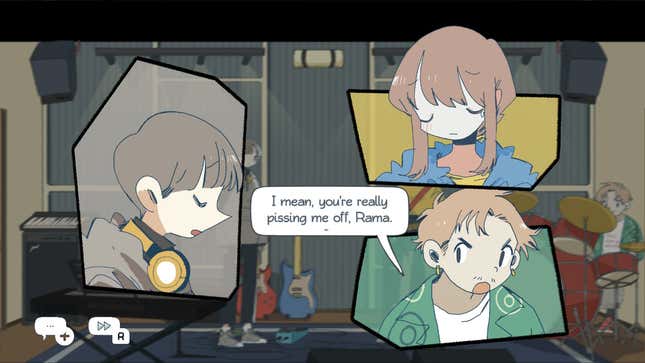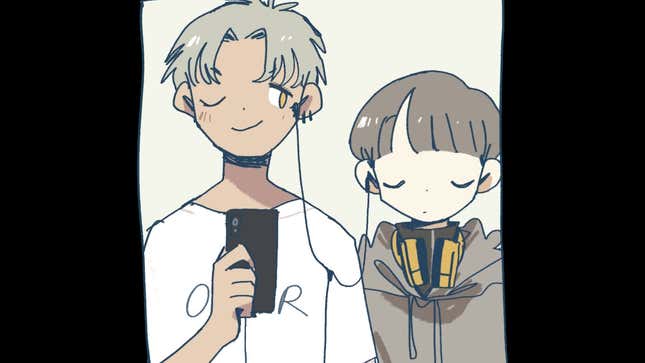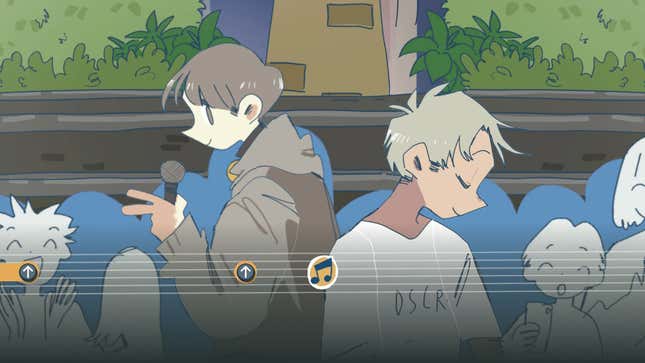In March 2022 Mohammad Fahmi, creator of the chill, acclaimed narrative game Coffee Talk, tragically died at the young age of 32. Three months prior, he’d revealed his next game, Afterlove EP, a rhythm-narrative adventure game about carrying on after losing a loved one. Three years later, the game has been brought over the finish line by the rest of the team at Indonesian studio Pikselnesia, with a result that feels unavoidably prescient. Though Afterlove EP isn’t without its flaws, its meditation on the mundane ways grief distorts us, and the unglamorous journey of finding our way back to the light, offers an understated catharsis.
Afterlove EP follows Rama, an indie band frontman who loses a part of himself when his partner Cinta unexpectedly passes away. He spends a year in self-inflicted isolation, and by the time he’s ready to crawl out of his apartment and try to be a person again, he’s surprised to see how much of the world has moved on without him. Or, at least, tried to. His bandmates have felt trapped in his indecision, so they’ve been looking for lifeboats off a sinking ship with new projects and career paths. Rama expected everything to be where he left it a year ago. Afterlove EP spends much of its time underlining that while grief deserves sympathy, it doesn’t become a free pass to treat people however you want.
Grief requires some grace. No one handles the loss of a loved one “perfectly,” and a story that criticizes someone going through that pain can be a tough sell, and easy to fuck up if its characters come off as irredeemable or its approach feels insensitive. Afterlove EP starts out with Rama hearing the disembodied voice of Cinta encouraging him to get back out there and perform again, but as the game goes on, it becomes clear it’s less an echo of a lost loved one and more a manifestation of Rama’s inner monologue. Cinta is defensive and accusatory, and puts Rama’s feelings above everyone else’s. As I lived out Rama’s life, I gradually became frustrated when Cinta would weigh in. This wasn’t the compassionate person her grieving friends described, it was someone who almost always defaulted to Rama’s point of view, siding with him even when his friends had grievances that were more than reasonable.

If that disconnect between player and protagonist sounds frustrating, it is, but it makes Rama’s growth and the story’s pay-off so much sweeter. Rama starts off sympathetic. He’s grieving the loss of someone who was clearly close to him, but the longer I played Afterlove EP, the more it became clear he was myopically obsessed with his own pain and ignoring how others were affected by his absence. The identification I felt with him gradually gave way to alienation as I stood by and watched his relationships unravel, like I was a friend powerless to stop someone I care about from falling further down into despair. Afterlove EP gave me plenty of opportunities to argue with my friends who felt abandoned by me, but for most of the game, I couldn’t find dialogue options that resembled an apology for my absence, my belligerent musician’s ego, or the selfish way I talked about my grief as if it was more important than anyone else’s. I spent hours of Afterlove EP watching people who cared about each other nearly lose one another because Rama couldn’t see past his own pain. Every time I met up with bandmates trying to pick up where things left off, it felt like the ties between them were one wrong word away from snapping as he insisted on his own vision of the music and the band’s future, and was indifferent to his friends’ pain after they lost a friend, too. Rama can be a frustrating character to pilot in a dialogue-based game, and Cinta’s inability to challenge him made me skeptical of her from the beginning, but Afterlove EP’s commitment to its damaged hero and his dysfunctional friend group is a crucial piece of the story it’s telling.
There’s a fine line between a sympathetic protagonist and a selfish one, and Afterlove EP balances on it so well that by the time I was hours into Rama’s story—watching him be so fixated on his own shit that he was hurting those closest to him—I only felt sorry for him. He couldn’t see the forest for the trees, even in the face of so many possibilities for forming new connections and repairing old ones.

Afterlove EP plays like a Persona game in which you manage relationships and work each day, deciding whether to spend your limited time seeing friends, busking for money, going to therapy to unpack all the discord within your social circles, or possibly building a relationship with a new suitor. I spent most days hanging out with Satria, a record store shopkeeper who knew exactly how to push Rama’s buttons. He’s part of a queer community that plays music in the local park. Rama hasn’t explored this side of himself, and that kind of self-discovery isn’t made easier by having the disembodied voice of your ex talking to you while you try to form new connections. However, Afterlove EP doesn’t reach for the low-hanging fruit I expected it to when it comes to Rama finding new love. Given Cinta’s hold on him, I feared that Rama moving on to a new partner might see the game create a toxic love triangle in his mind, but instead, things play out quite differently. It was a welcome change after Rama’s mourning had gotten in the way of him moving forward for most of the game. Grief is the foundation Afterlove EP is built on, but its waxings on the topic aren’t the only thing it has to say.
The thread connecting all these relationships is the indie rock music Rama plays. When you’re not chatting with friends and potential lovers, Afterlove EP is a rhythm game with some really catchy tracks that capture the spirit and gusto of young performers who want a life for themselves outside of the bars and kitchens they work at now. Even if I can’t understand the Indonesian lyrics, I feel the pain and yearning in Rama’s voice and the heavy riffs underneath.

That being said, Afterlove EP’s rhythm game segments are exceptionally hard to read. Each note you play runs down a sheet music-like track, prompting you to press one of the four directional buttons when it reaches the center of the screen. The way it’s presented can be disorienting and frustrating—its use of directional inputs comes with a muscle memory expectation that some of the movement you’re seeing should correlate to which button you’re pressing. Instead, I tripped up a fair bit as notes came from the right side of the screen but required me to press up or down. Rhythm games, like playing a real instrument, are meant to be instinctual. You train yourself on something long enough and it becomes muscle memory embedded in your fingertips. Afterlove EP’s UI design is minimalistic, and doesn’t communicate its mechanics well, so it never quite reaches that level of intuitive rhythm you need to get lost in the music.
Like Rama’s music, Afterlove EP balances the thorny and heartwarming parts of love and loss. Given what the Pikselnesia team went through to make it happen, it’s not surprising that it understands all the ugly and beautiful parts of losing someone you care about. A lot of Afterlove EP guides you by the hand through the mundane parts of becoming a person again. When you lose parts of yourself, finding something new, good, and healthy to fill that void isn’t always glamorous or fun. It can be awkward and uncomfortable, and require talking to people who see through your bullshit and call you out on it when you can’t see past it yourself. Afterlove EP is sympathetic to the fact that none of us handle grief in a way that is easy to swallow for everyone around us, but its best moments come when it’s willing to slap you across the face and tell you to do better.
Source link











Add comment